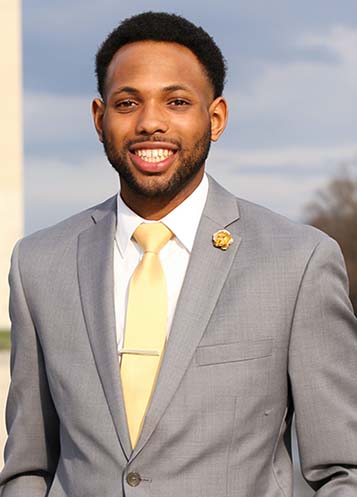
Richmond Hayes is a doctoral student in the counseling psychology program at University of Illinois at Urbana-Champaign. He earned his M.A. in forensic psychology from the George Washington University and his B.S. in psychology from Howard University. He is a traditional doctoral-level Mental Health and Substance Abuse Services (MHSAS) Minority Fellowship Program (MFP) fellow with the American Psychological Association (APA), with an anticipated graduation date of May 2024.
Richmond was initially drawn to the MFP because of the many benefits that the program offers. He shared, “For anyone, completing a doctoral degree is a challenging enterprise. Still, for traditionally marginalized people, it is not only difficult on an individual level, but it is also imperative to our communities that we succeed in seeing this process through. I saw a village when I submitted my application to the Minority Fellowship Program—one that I could lean on for financial assistance as well as socio-emotional support.”
When reflecting on how the MFP has enriched his academic and professional career, Richmond shared that it provides opportunities to expand his knowledge base and increase his efforts to advocate for marginalized populations. He explained, “The informational offerings, such as webinars facilitated by the MFP, have already increased my knowledge of and capacity to work with individuals who have concerns around their use of substances and/or process addictions. Additionally, the MFP has encouraged me to continue advocating for individuals with serious mental illnesses reentering the community from jail and prison—by consistently endorsing my work in this area.”
Currently, Richmond is conducting research to understand hope among Black, Indigenous, and People of Color (BIPOC) transitioning from incarceration back into the community. He shared, “This research is significant because throughout U.S. history, BIPOC have demonstrated hope amid oppression in a myriad of ways. My project seeks to answer the following research questions: 1) How do BIPOC transitioning from incarceration back into the community conceptualize and foster hope? and 2) Does the conceptualized model of radical hope for BIPOC apply to the lived experiences of these individuals?”
Richmond plans to integrate the knowledge and skills acquired from the MFP to address barriers that prevent previously incarcerated racial/ethnic minorities from successfully reintegrating into their communities. He explained, “In conjunction with my early research project and consistent with the major objectives of the MHSAS program, I am co-creating a support services and counseling component at the First Followers reentry program. In this process, I am both learning how I can be of service to the Champaign-Urbana community and gaining more experience directly related to my ultimate career goals.”
Upon completion of the MFP, Richmond intends to support individuals, families, and communities disproportionately affected by the criminal legal system. He shared, “I am dedicated to providing culturally competent, behavioral health services to racial/ethnic minorities and committed to becoming a chief psychologist in the Federal Prison System. Although this role is responsible for supervising specialized treatment programs, I am even more excited about the prospect of serving a community-based reentry program at some point in my career.”
When asked if he had any advice for anyone thinking about applying to the MFP, Richmond said, “I would tell someone who is thinking about applying to the MFP not to think twice about it. You have nothing to lose and everything to gain. You are your best advocate. So, don’t stop until you get what you need!”
In closing, Richmond has this to share, “I truly feel that the MFP will be a lifetime network of professional association for me. Evidenced by the relative ease in establishing relationships with current and past fellows, I am exceedingly confident that the MFP will remain a resource that nurtures and grows my network of professionals focused on racial/ethnic minority behavioral health. The MFP family is filled with like-minded individuals who can help burgeoning psychologists, like myself, to forge our own paths as they retrace and re-member their own.”